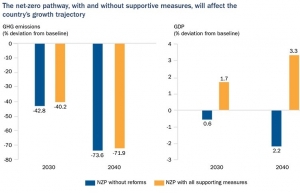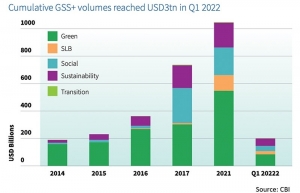Organisations lend hand for sustainable forestry in Vietnam
To achieve the targets, the forestry sector and local government require strategic implementation and good practices in the field. This will be carried out through partnerships with donors such as the EU, the US Agency for International Development (USAID), WWF Vietnam, and MCNV.
 |
| Nguyen Dinh Dai - Central Vietnam chief MCNV Office |
The province of Quang Tri has created strategic results in sustainable forestry development thanks to the support from international organisations, and there are already many interesting stories regarding this.
One regards promoting market links on non-timber forest products (NTFPs) between smallholders and enterprises. Nhien Thao is a local enterprise in Quang Tri province that produces natural-based products such as shampoo, floor cleaning liquids, and dishwashing liquid. NTFPs including soap, black locust seeds, and essential oils are key raw materials for the production of the enterprise.
Currently, Nhien Thao is collaborating with about 150 smallholder forest owners in supplying NTFPs with a value of about $75,000 annually. These smallholders are managing hundreds of hectares of natural forest where they can harvest different kinds of NTFP such as soap nuts, black locust seeds, pomelo, and limes. The enterprise is planning to expand its business and network with smallholders.
In April 2022, the enterprise was awarded the prize of best natural business solutions by the New Generation Plantation and WWF Vietnam. This is a win-win business model for the smallholders and enterprises in contributing to sustainable forest management.
Another example is the long-rotation plantation for tung oil production. It is estimated about 1,500 tonnes of dry tung oil seeds are harvested annually with a value of $650,000 in Quang Tri province. Since 2020, the PROSPER project (on promoting sustainable partnerships between civil organisations and enterprises for sustainable forest management in the context of climate change), co-funded by the EU and MCNV, has supported smallholders in planting about 300ha of tung oil plantation mixed with indigenous species in Quang Tri province.
Tung oil plantation has contributed to forest protection and annual income for smallholder forest owners from harvesting tung oil seed.
With the support of the USAID, the provincial Department of Agriculture and Rural Development is planning a 5-year strategy for tung oil plantations. This model will contribute directly to annual income for smallholders, increasing forestry cover ratio and carbon capture from the long-rotation of tung oil plantations.
Within the PROSPER project, for the first time in Vietnam, two natural forests of smallholders in Huong Hoa district have earned FSC certification on sustainable forest management, in which three bamboo species are certified FSC. In 2022, the project targets to achieve certification for carbon capture, bio-diversity, and rattan.
By December 2020, about 20,000ha of natural forest had been allocated to smallholders in Quang Tri province, in which around one-third received the Payment of Forest Environment Service for forest protection. The rest of the forests are protected voluntarily by smallholder forest owners. The piloted model on FSC-certified ecosystem services offers potential for smallholder forest owners in accessing payment mechanisms for forest ecosystem services and the high-value market of NTFPs of FSC-certified rattan and bamboo.
This association of smallholder forest certification was established in 2014, supported by WWF Vietnam. The association is a representative for smallholder forest owners in FSC certification for acacia plantations and has been a link between IKEA suppliers and smallholder forest owners in supplying FSC-certified wood.
In 2020, under the support of PROSPER, for the first time, the association recruited new natural forest owners as members. This achievement brought a new direction in promoting sustainable forest management of smallholders in both plantations but also the natural forest.
Quang Tri province is considered one of the pioneers in sustainable forestry development strategies. The concrete practices in the field are significant to show scaling up in the aspect of implementing the programme on sustainable forestry development until 2025.
 | Rallying cry for Vietnam’s steadfast net-zero strategy Vietnam may have to mobilise a colossal amount of funding to fulfil its international commitment to achieve net-zero emissions by 2050, with a hallmark new strategy on climate change response soon to be enacted. |
 | Financing the net-zero transition Recent projections continue to show Vietnam as the fastest-growing economy in Southeast Asia coming out of the pandemic. Srinath Komarina, programme manager at the Global Green Growth Institute in Vietnam, explains how using innovative instruments like green bonds can meet the country’s targets, both for the environment and the economy. |
 | Nation’s net-zero aim given strategic boost Vietnam’s fresh national climate change strategy, which highlights a crucial energy transition, will help the country reduce greenhouse gas emissions and fulfil its international commitment. |
What the stars mean:
★ Poor ★ ★ Promising ★★★ Good ★★★★ Very good ★★★★★ Exceptional
Related Contents
Latest News
More News
- Kurz Vietnam expands Gia Lai factory (February 27, 2026 | 16:37)
- SK Innovation-led consortium wins $2.3 billion LNG project in Nghe An (February 25, 2026 | 07:56)
- THACO opens $70 million manufacturing complex in Danang (February 25, 2026 | 07:54)
- Phu Quoc International Airport expansion approved to meet rising demand (February 24, 2026 | 10:00)
- Bac Giang International Logistics Centre faces land clearance barrier (February 24, 2026 | 08:00)
- Bright prospects abound in European investment (February 19, 2026 | 20:27)
- Internal strengths attest to commitment to progress (February 19, 2026 | 20:13)
- Vietnam, New Zealand seek level-up in ties (February 19, 2026 | 18:06)
- Untapped potential in relations with Indonesia (February 19, 2026 | 17:56)
- German strengths match Vietnamese aspirations (February 19, 2026 | 17:40)

 Tag:
Tag:




















 Mobile Version
Mobile Version